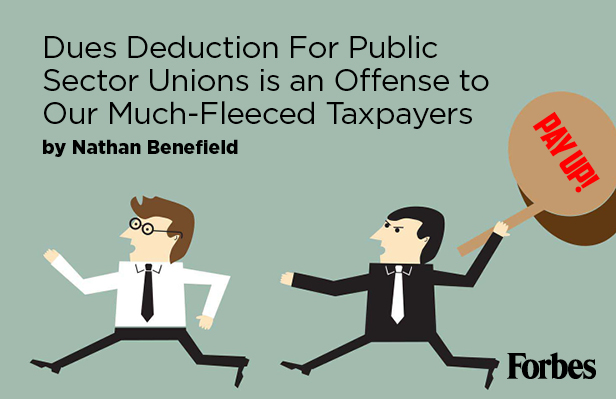Commentary

Dues Deduction For Public Sector Unions Is An Offense To Taxpayers
Note: This commentary was originally published by Forbes.
It was the last straw for teacher Steve Calabro. When the Pennsylvania State Education Association (PSEA) ran advertisements claiming any teacher who didn’t contribute to the union PAC was part of the “Gov. Tom Corbett fan club,” he had seen enough. Steve, a teacher from Lackawanna County in northeastern Pennsylvania wrote, “the PSEA’s political agenda has blinded them into complete disregard for their own membership … this kind of ad is one example of the types of activities that made me disillusioned with the PSEA.”
Steve isn’t alone. Across the country, public school teachers are frequently forced to fund their local unions and their overtly political agenda. Their only other option is to lose their jobs.
That may come as a shock, given the freedom to support-or not support-candidates and political causes is sacrosanct to most Americans. Yet in many states, government unions use automatic dues deduction to short-circuit individual choice, forcing workers and taxpayers to fund political causes contrary to their own beliefs and values.
Government union contracts often require that state and local governments use taxpayer-funded payroll systems to deduct union dues, fees, and even PAC money from their employees’ paychecks and then cut a check directly to union accounts.
With access to steady streams of funding, it’s no surprise that unions are giants of political advocacy. Nationally, union leaders spent a whopping $1.7 billion on lobbying and electoral politics over the last two years, according to an analysis by the National Institute for Labor Relations Research. Indeed, 11 of the top 20 federal political donors are unions.
Sadly, teachers themselves are often unaware of how this unfair system works. Robin Fought, who teaches in the Avon Grove School District outside of Philadelphia, noted, “To my surprise, our school district resources as well as my tax money are being used to deduct not only union dues, but political action committee funds for PSEA-PACE [the union’s PAC] that go to candidates that I do not support.”
While teachers, state workers and other government employees can opt out of paying full union dues, in 26 forced-unionization states they may still be required by union contract to pay a “fair share” fee just to keep their jobs.
Even in right-to-work states, government employees often have union dues and PAC money taken right out of their paychecks, regardless of whether they agree with the union leaders’ political agenda.
Examples of that agenda are hard to miss. In my home state of Pennsylvania, the PSEA long denied that there was a funding problem for the state’s pension programs—currently $47 billion in the hole. This year, when a plan was put forward to move new employees into 401(k)-type plans, the union blamed the legislature for the problem, and claimed current teachers would see their retirements cut.
But it’s not just the teachers’ union. UFCW Local 1776—which represents clerks in our archaic government wine and spirits stores—spent more than $1 million this year on TV and radio ads denouncing privatization. Another union of liquor store managers even lobbied with public resources against transportation funding to derail liquor privatization last spring.
Some 66 percent of Pennsylvania voters want to purchase wine, beer and liquor in private stores-including a majority of union members. But those same voters and union members are forced to collect the funds for the union leaders’ media blitz.
States have taken steps in recent years to correct this unfair practice. Washington, Idaho, and Wyoming require unions to regularly get written consent from workers before employers can deduct political money. Utah stopped state government from collecting any funds used for politics from workers’ paychecks. And Indiana, Michigan, and Wisconsin have gone even further, prohibiting various levels of government from collecting union dues and PAC money.
Unions have every right to engage in political activity, just as individual workers do. But such political action should be voluntary. Workers should have a right to choose where their hard-earned money goes, and it is unfair to force taxpayers to pay for partisan politics.
# # #
Nathan A. Benefield is director of policy analysis at the Commonwealth Foundation
(CommonwealthFoundation.org), Pennsylvania’s free market think tank.